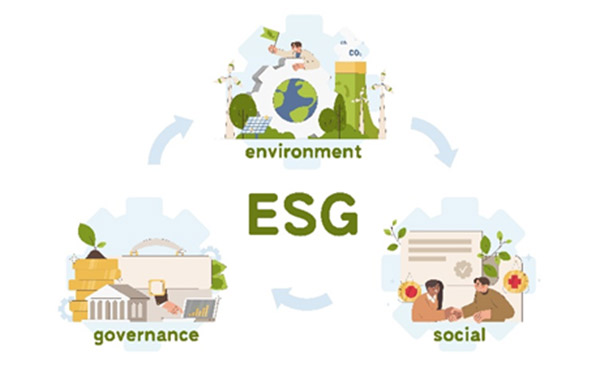
First appearing in the 1950s, CSR is an abbreviation for the phrase Corporate Social Responsibility - a company's obligation to society. The foundation of the current concept of ESG is that a company has excellent CSR when it achieves profitability without causing harm to society or individuals within the organization. Environmental, Social, and Governance (ESG) is a framework used to assess how a corporation manages the risks and opportunities that shifting market and non-market conditions create. ESG consists of three factors:
Environmental: This concept assesses the influence of corporate operations on the environment and natural resources. Waste management, energy saving, the utilization of renewable resources, and emission reduction are all environmental factors. Individuals and corporations are becoming more concerned about sustainable development, especially in light of significant environmental challenges such as the COVID-19 pandemic, El Nino-induced global warming causing widespread wildfires, and ecological imbalances endangering human health.
Social: ESG focuses on assessing social factors, such as labor equity, occupational safety, supply chain management, community impact, and corporate ethics. This ensures that a company takes steps to create a trustworthy and equitable workplace and contributes positively to society and the local community. In addition, the "S" in ESG requires businesses to express their position on the essential workplace, partner, and customer issues. ESG also evaluates how a company manages its relationships with shareholders.
Governance: The objective of ESG governance is to assure transparency, business ethics, and management decision authority. This includes disclosing information and annual performance results to the public, safeguarding intellectual property rights, implementing anti-corruption and bribery measures, selecting responsible leadership, and holding shareholders accountable.

In addition, ESG is seen as a measure of a company's resilience and adaptability in the face of global change. It's a benchmark for helping businesses assess the potential hazards and rewards of these shifts. Companies are scored on the ESG index according to their social and environmental responsibility as well as the quality of their management. A higher ESG score indicates greater compliance with ESG criteria. There is presently not widely accepted ESG evaluation standard since ESG standards are broad and related to a wide range of concerns, and some of these issues may be defined differently depending on the industry, company characteristics, and business model in question.
The positive effects of ESG are substantial. Positive effects of ESG on basic business concerns that affect an industry's long-term viability are common. A company's operations, the ease with which its goals can be achieved, and its readiness to handle crisis situations with important stakeholders are all bolstered by its ability to manage ESG factors effectively. For instance, Facebook's reputation for handling cyber security threats took a major hit after the Cambridge Analytica incident (2018), costing the company billions of dollars in market value. Because of the pollution they generate, companies have taken on a greater role in environmental responsibility as science and technology have progressed. First, the physical effects of climate change on a company's assets and the infrastructure around it might have repercussions for the company's stakeholders or business partners, notably in terms of supply and demand, as well as the company's ability to conduct business in a changing climate. Examples include the effects of flooding and rising sea levels on local communities, infrastructure, and property prices. Second, it's important to take precautions and manage risks. By considering environmental, social, and governance factors, businesses can better recognize and control potentially damaging situations. Negative effects on a company's operations, goodwill, and bottom line can be mitigated. This method of preventative risk management helps ensure the sustainability and robustness of an organization throughout time. Furthermore, ESG assists organizations in recognizing both immediate and future threats (such as the availability of resources, labor, and workforce; changes in regulatory frameworks) that may affect their particular industry and company strategy. To indicate unmet demands for new products and services, underserved client groups, and strategic alliances to solve ESG challenges, ESG is also useful as a means of managing and capturing opportunities when the market and non-market situations evolve.

Finally, financial results are inversely proportional to the extent of ESG development. Long-term financial success is more likely for a corporation with higher ESG growth. Companies can boost earnings, appeal to investors, and have easier access to capital by managing ESG elements such as lowering operational risks, increasing resource efficiency, and responding to stakeholder concerns. Businesses can get an edge in the market by demonstrating leadership in the ESG space. Trust and a positive image among consumers, financiers, and other stakeholders benefit greatly from this. Sustainable, socially responsible, and well-governed businesses stand out from the competition and win over consumers that care about these issues. A firm's dedication to creating a high-performing staff, defining goals, and constructing a company culture can be measured by their ESG growth index. Including environmental, social, and governance (ESG) considerations in valuations help investors better comprehend intangibles like company culture, operational efficiency, and risk.
The process and transparency in ESG report of businesses in particular:
Valuation: Many investors also consider ESG ratings and evaluations prior to making investment decisions, so analysts should pursue ESG-related or company-specific reports for valuation purposes. By identifying consistency in the evaluation, rating, and reporting of a company's ESG practices, analysts can add value. Specifically, analysts must comprehend the various approaches to ESG and the ESG reporting of a company.
Shareholder Voting: Shareholders can vote to support the implementation and compliance of ESG policies and standards within a business. This may involve proposing and approving policies concerning environmental protection, labor rights, fair treatment, and good governance.
Request For Proposal (RFP) Decisions: They play a crucial role in the selection of ESG-aware suppliers or partners.
Through analysis and evaluation, businesses can make important decisions to contribute to the creation of accurate and relevant ESG reports.
In Vietnam, ESG indices are also gaining popular. Currently, numerous businesses have embarked on sustainable development implementation and achieved initial successes. For example, FPT has provided digital transformation solutions to help local authorities achieve sustainable development, Vinfast has received a $135 million climate change finance package from the Asian Development Bank (ADB), and Vinamilk has invested in renewable energy systems and signed a memorandum of understanding to implement tree planting activities for carbon neutrality, aiming for Net Zero with a total value of VND 15 billion. Furthermore, the government has issued a series of strategies and plans to assist enterprises with sustainable development and prioritize the implementation of sustainable development models. The efforts of businesses and the government are aimed at building a sustainable economy and society, contributing to comprehensive development, and environmental protection, mitigating negative effects of climate change, and generating long-term benefits for the community and future generations.
DCF Vietnam - Regulated by RICS
This document's contents have been synthesized and analyzed from sources considered reliable; however, they are provided for general informational purposes only and are not intended to be a comprehensive analysis. Additionally, this document should not be considered as an advice. The structures, figures, and illustrations derived from this document may not be suitable for specific situations or requirements, and DCF Vietnam urges clients to seek specialized investment advice tailored to their specific situations or requirements. DCF Vietnam makes no representations as to the accuracy, dependability, or completeness of the information provided.
----------
Please contact us for more information:
DCF Viet Nam Corporation
🏢 46F, Bitexco Financial Tower, 2 Hai Trieu, Ben Nghe Ward,
District 1, HCMC
💌 info@dcfvietnam.com
☎️ 0763 304 430
🌐 www.dcfvietnam.com